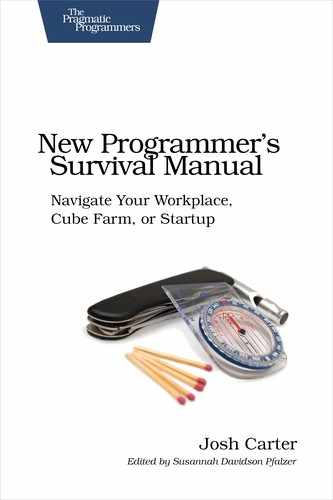| Tip 24 | Meet Effectively |
 | [White Belt] You’ll get invited to meetings from day one, so this is stuff you can use early—especially the bit about toilet flush timing. |
Many consider meetings the bane of productivity; nowhere else can so many people waste so much time together. This isn’t entirely untrue. However, meetings are necessary, and some are even productive.
The theory behind meetings is simple: decisions need to be made, so get the right people in a room, hash out the issues, and make a decision. In terms of “communication bandwidth,” there’s nothing more effective than a face-to-face talk. Email isn’t very expressive and has high latency. Phone calls are somewhat more expressive, but it’s easy for people to zone out. I’ve never been impressed with video conferences. Face-to-face is definitely the best way to communicate.
If talking directly with people is so effective, then, where do the meetings of endless tedium come from? You know, the cross-functional task forces on employee productivity? I sat through a meeting where twenty managers were involved with this critical question: do we discount some machines that have scratched covers, or do we spend the money to repaint the covers? Consider the cost of twenty managers’ salaries for a fifteen-minute debate about paint. How much does a can of spray paint cost?
You’ll be involved in some stupid meetings; just accept that. However, you can help keep meetings productive and, I hope, set a good example for others.
Having a Purpose
When you’re invited to a meeting, consider what the organizer is trying to get out of the meeting. Ideally that’s stated clearly in the invitation. Most often it’s not.
Let’s say you’re invited to a “cross-functional planning meeting” where you’re supposed to “coordinate project activities” with other departments. That sounds like a noble cause, but what do people actually have to do? You can encourage a clearer purpose by asking the meeting organizer one-on-one, either in person or in email:
-
Can you clarify the desired outcome of the meeting?
-
What do I need to prepare ahead of time?
Don’t be a smart-ass about it; keep your tone constructive. Remember, the organizer may not be responsible for this meeting monstrosity; they may be doing it just because they were told to do it. Your polite inquiry about outcomes and preparation will ideally nudge them to send out a real agenda.
Obviously, if it’s you calling the meeting, ask yourself these questions ahead of time and use the answers as the basis for your agenda.
Having the Right Audience
Given a purpose, the other key ingredient is having the right people in the room. If you’re looking for information, who has it? If you need a decision, who has the authority to make it? If it’s a cross-functional task force, what functions do you forcefully want to cross?
You won’t have much influence over the audience of other people’s meetings, but you do have some control over your attendance. Don’t just skip it; that’s disrespectful. Instead, if you’re invited to a monster meeting that you don’t think you can contribute to, ask the organizer (again, one-on-one) if you need to attend.
Keep It Constructive
When you’re in a meeting that devolves into whining and complaining, ask yourself whether can you nudge the conversation in a constructive direction. Here’s an example:
- Dave:
-
The web servers can’t handle that kind of load; they suck.
- Emma:
-
No kidding, and the database server sucks, too.
(blah blah blah… more complaining here)
- You:
-
Is there another way we could solve the problem, like caching more pages to reduce the load?
You don’t have to come up with something brilliant; you just need to steer the conversation toward solutions rather than griping about problems. Programmers are great at dwelling on problems because, frankly, it’s easy. Coming up with solutions—even if they don’t pan out—requires talent.
Conference Calls
When meeting attendees are scattered over the globe, common practice is to get people on a conference call. There’s nothing very special about these calls, but a couple tips may help. First, keep in mind that most people on a call are not paying full attention. If you need to ask someone a direct question, give them some lead-in: “I want to ask about our test suite. Bob, can you tell me about…” Assuming Bob is the test suite guy, that gives him a heads-up before you get to the meat of your question.
Second, mute your phone when not talking, especially if you’re not paying full attention—it takes only one toilet flush to completely derail a call. (While I’ve never been guilty of the toilet flush myself, I have “attended” boring conference calls while laying in the bathtub.)
Actions
Try playing the role of meeting organizer. Surely, there’s something about your project that could use feedback from others in the company. When you have something worth meeting about, try this:
-
Schedule the meeting for no longer than you think you need, even if it’s just fifteen minutes.
-
Invite only the people you think need to attend; don’t shotgun your address book.
-
Send out the agenda and the desired outcome one day ahead of time.
-
When the meeting is over, it’s over—even if you didn’t use all the time you scheduled. Thank people for their time and let them get back to work.
-
If appropriate, email meeting minutes to the attendees, paying particular attention to any commitments made. These “action items” let everyone know who’s on the hook to do something about what was discussed in the meeting.
Even if the attendees aren’t thrilled about going to another meeting, they’ll be pleasantly surprised when you stick to the agenda, get what you need, and let them go.
Footnotes
| [35] |
Author of How to Win Friends and Influence People |
| [36] | |
| [37] |
See Pragmatic Thinking and Learning [Hun08] by Andy Hunt. |
| [38] |
http://www.capt.org/mbti-assessment/estimated-frequencies.htm |
| [39] | |
| [40] |
Getting Things Done: The Art of Stress-Free Productivity [All02] |
